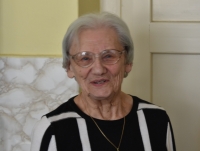The worst part was losing my job
Download image
Božena Pačandová was born on 9th July 1934 in Slatinské Doly in Carpathian Ruthenia. She lived there with her family until 1939, when the Hungarians occupied Carpathian Ruthenia and her father, being a police officer, had to flee to Bohemia with his family. They settled in Strmilov in the Jindřichův Hradec region, where her father came from. After the war, her father was placed in Dolní Dvořiště in the German border area, but after the onset of communism, he was fired because he had helped two friends cross the border. So they returned briefly to Strmilov to his grandparents’ farm before his brother found him a job in a dairy in Poděbrady. Because of her father’s quarrels with the communist regime, Božena and her siblings could not study, so she began working in an office on a state farm at the age of fifteen. After moving to Poděbrady, she joined the office of the Purchase Agricultural Enterprise, which later moved to Nymburk, where she commuted. In 1962, she started working in an accounting office of the central storage of the Ministry of Interior in Dymokury, from where she was fired after 1968 because she compared Russian soldiers to the Nazis. She returned briefly to the Purchase Agricultural Enterprise, from where she then went to the District Police Department in Poděbrady, where she worked until her retirement in 1989.
